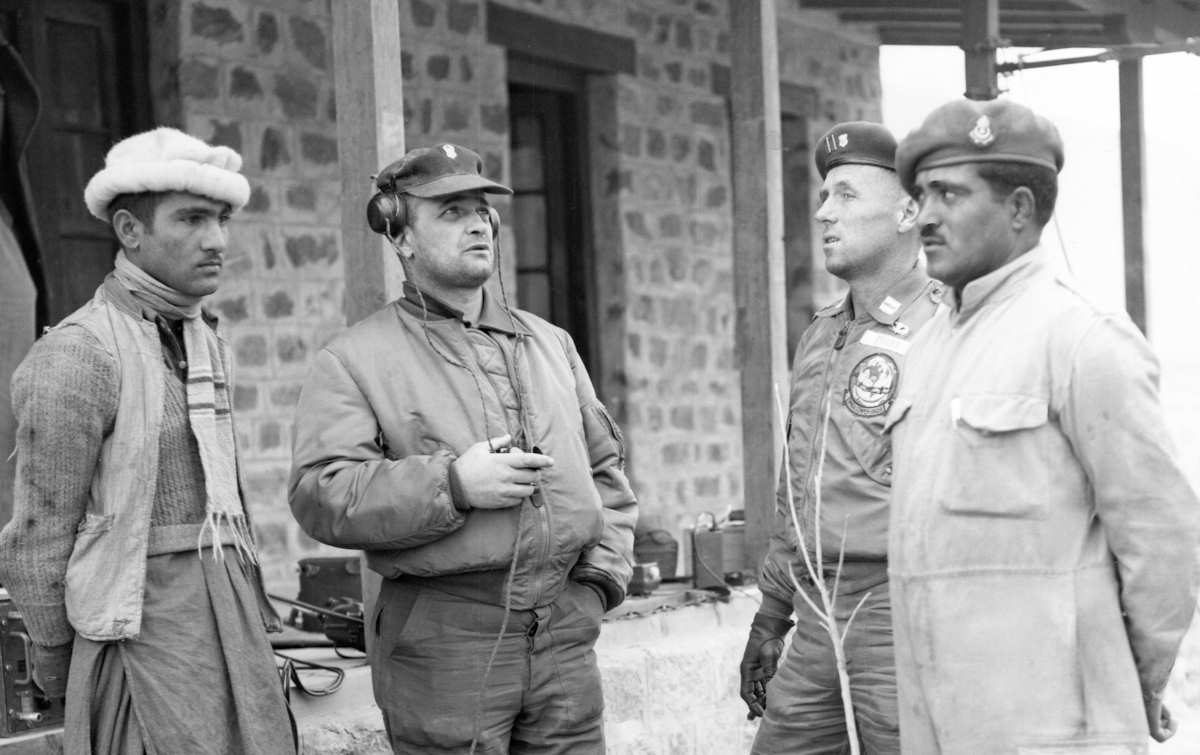10
thru18 December 1960 at the request of the Pakistani Air Force, USAFE
airlifted 600 tons of cement and 64 tons of heavy construction
equipment from Peshawar Air Base and airdropped them over Chilas ,
Kashmir to assist a road-building project in Northern Pakistan. Six
C-130s of the 322nd Air Division based at Evreux, France flew a total
of 55 sorties during the project, known as Operation Road Grader.
Four USAF Combat Controllers of the 5th Aerial Port Squadron were
tasked to support the mission.
Capt. Buck Evans, MSgt. Alcinde Benini, TSgt. Charlie Drew and SSgt. William A. Fitzgerald jumped at Chilas, Kashmir. Buck Evans and Charlie Drew were from the 5th Aerial Port Squadron Combat Control Team at Evreux, France while Alcinde Benini and William Fitzgerald were from the Detachment of the 5th at Wiesbaden, Germany.  Above;
Arrival to the Deans Motel in Peshawar with (pictured) Pakistini
escort, Buck Evans, Bill Fitzgerald, Bull Benini, and Charlie Drew
Below;
Mission Brief, Parachute in and control air drops in support of the
mission. We were never told of any particular name for the
mission, only that we were supporting the Pakistanis in their effort
against India over the disputed rights to Kashmir. And, that the
mission was tasked by the State Department. We were also briefed that
the Pakistanis were going to build a runway, not a road. We really
don't know what they built after we left, and the mission was
classified for quite a few years.
   Buck
Evans pretty much jumped Hollywood, Benini had a Griswald Container
with a shot gun , Charlie Drew had a Griswald Bag with a fishing pole
and I had a GP bag full of shotgun shells (you can't believe how heavy
that sucker was). The Air Attaché arranged to have booze
dropped to us upon request (every other day if memory serves me right).
  The locals couldn't believe that we had jumped from an airplane. That was beyond their ability to comprehend. It was amazing how isolated they were then.  Most of our equipment was dropped via an A-22 container. We had a
portable VHF set and PIBAL equipment. Since the 130's were briefed to
fly up the valleys below radar they could not get a decent CARP so we
had to provide the winds aloft for them to figure their CARP. That was
mostly my function.
 We stayed in an old stone building nearby. It had a fireplace and a dirt floor but otherwise was OK (better than sleeping outside). Our diet consisted of c-rations and Partridge (the shotgun and shells came in handy).        On the 21st of December we started out for our pick-up point which was Gilgit, approximately sixty miles from our location. We rode some, walked some, crossed over wooden suspension bridges and over several landslides. Question to William A Fitzgerald: Did you travel by Camel Caravan?
Response from William A. Fitzgerald: No, they weren't our
mode of travel from Chilas to Gigit. It
would have made for a good ending though if it were true. A local
pointed the caravan out to me ( it was below the road we were on )
while enroute to Gilgit and I thought it was too good of a picture to
pass up. We traveled by jeep when possible and foot when not. They
wouldn't let us ride in the jeeps going across the bridges as they
didn't know how much weight they would bear and they only let one jeep
cross at a time. Often you could look straight down from the side of
the jeep and see the Indus River or a small valley around a thousand
feet below. It was breathtaking to say the least.
 Above; Bridge to Giget; Buck Evans, Bull Benini, Pakistani, Charlie Drew, and Bill Fitzgerald walk across this bridge
  The Pakistanis had an old Bristol Freighter at Gilgit to take us back to Peshawar, Pakistan.
We departed Peshawar on the 23rd of December and landed in France on
the 24th. Benini and I had to get back to Wiesbaden but on the 24th of
December nothing was flying. So, after a call to the Division
Commander, they laid a 130 on to fly us and one Christmas Tree to Rhein
Main. Benini and I made it home to Wiesbaden around midnight of the
24th. Our families had given up hope of our being there for Christmas so they were really surprised.
You may also read about this operation in the book; The Military History of Chief "Bull" Benini, the First Combat Controller. Email Gene Adcock of the CCSHF for a copy of the book, all proceededs used to fund CCSHF Projects..... Keep Our Heritage Alive!
|
